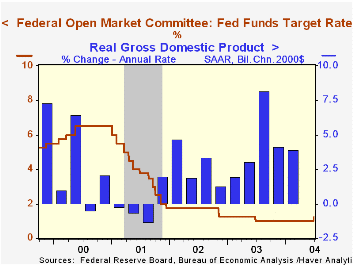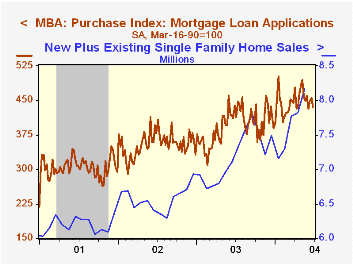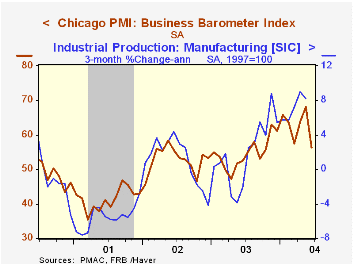 Global| Jun 30 2004
Global| Jun 30 2004FOMC Raised Interest Rates; 1st Time Since May 2000
by:Tom Moeller
|in:Economy in Brief
Summary
As expected, the Federal Reserve raised the target rate for federal funds by 25 basis points to 1.25%. The discount rate also was raised to 2.25%. The decision was unanimous. The press release which accompanied the Fed's action [...]

As expected, the Federal Reserve raised the target rate for federal funds by 25 basis points to 1.25%. The discount rate also was raised to 2.25%.
The decision was unanimous.
The press release which accompanied the Fed's action indicated that "The evidence accumulated over the intermeeting period indicates that output is continuing to expand at a solid pace and labor market conditions have improved. Although incoming inflation data are somewhat elevated, a portion of the increase in recent months appears to have been due to transitory factors."
The Fed statement continued to indicate that "policy accommodation can be removed at a pace that is likely to be measured."
Here is the complete text of the Fed's latest press release.
"The Rates They Are A-changin' " from the Federal Reserve Bank of Cleveland is available here.
"Interest Rates and Monetary Policy: Conference Summary" from the Federal Reserve Bank of San Francisco can be found here.
Mortgage Applications Slideby Tom Moeller June 30, 2004

The index of mortgage applications compiled by the Mortgage Bankers Association slid 4.4% (-64.8% y/y) last week. With a few days remaining to tally, applications in June are running 11.6% below the May average which fell 18.9% from April.
Purchase applications fell 4.2% (-0.7% y/y). For the month purchase applications are down 4.7% from May, the second m/m decline this year.
During the last ten years there has been a 63% correlation between the y/y change in purchase applications and the change in new plus existing home sales.
Applications to refinance mortgages fell 4.7% last week (-83.9% y/y) .
The effective interest rate on a conventional 30-Year mortgage was about unchanged at 6.47%. The effective rate on a 15-year mortgage also was roughly stable at 5.96%.
The Mortgage Bankers Association surveys between 20 to 35 of the top lenders in the U.S. housing industry to derive its refinance, purchase and market indexes. The weekly survey accounts for more than 40% of all applications processed each week by mortgage lenders. Visit the Mortgage Bankers Association site here.
| MBA Mortgage Applications (3/16/90=100) | 06/25/04 | 06/18/04 | 2003 | 2002 | 2001 |
|---|---|---|---|---|---|
| Total Market Index | 575.0 | 601.2 | 1,067.9 | 799.7 | 625.6 |
| Purchase | 435.4 | 454.5 | 395.1 | 354.7 | 304.9 |
| Refinancing | 1,386.9 | 1,454.6 | 4,981.8 | 3,388.0 | 2,491.0 |
by Tom Moeller June 30, 2004

The Chicago Purchasing Managers Business Barometer for June gave back its gains in May & April with an 11.6 point decline to 56.4. Consensus expectations had been for a more moderate decline to 64.0.
During the last ten years there has been a 73% correlation between the level of the Chicago Business Barometer and three month growth in factory sector industrial output.
The new orders index declined sharply 56.8, its lowest level since September. Production also fell sharply to 53.9, its lowest since April of last year.
The employment index fell just moderately to 53.6. During the last twenty years there has been an 81% correlation between the level of this employment index and the three month change in factory sector employment.
The index of prices paid rose even further to 84.5 and slightly surpassed the 1995 high.
| Chicago Purchasing Managers Index, SA | June | May | June '03 | 2003 | 2002 | 2001 |
|---|---|---|---|---|---|---|
| Business Barometer | 56.4 | 68.0 | 52.4 | 54.7 | 52.7 | 41.4 |
| New Orders | 56.8 | 74.4 | 55.6 | 58.0 | 56.2 | 42.3 |
| Prices Paid | 84.5 | 80.0 | 49.6 | 55.8 | 56.9 | 50.4 |
Tom Moeller
AuthorMore in Author Profile »Prior to joining Haver Analytics in 2000, Mr. Moeller worked as the Economist at Chancellor Capital Management from 1985 to 1999. There, he developed comprehensive economic forecasts and interpreted economic data for equity and fixed income portfolio managers. Also at Chancellor, Mr. Moeller worked as an equity analyst and was responsible for researching and rating companies in the economically sensitive automobile and housing industries for investment in Chancellor’s equity portfolio. Prior to joining Chancellor, Mr. Moeller was an Economist at Citibank from 1979 to 1984. He also analyzed pricing behavior in the metals industry for the Council on Wage and Price Stability in Washington, D.C. In 1999, Mr. Moeller received the award for most accurate forecast from the Forecasters' Club of New York. From 1990 to 1992 he was President of the New York Association for Business Economists. Mr. Moeller earned an M.B.A. in Finance from Fordham University, where he graduated in 1987. He holds a Bachelor of Arts in Economics from George Washington University.
More Economy in Brief
 Global| Feb 05 2026
Global| Feb 05 2026Charts of the Week: Balanced Policy, Resilient Data and AI Narratives
by:Andrew Cates






